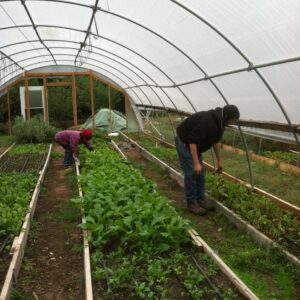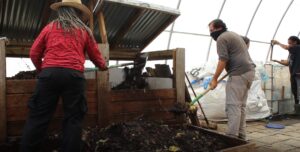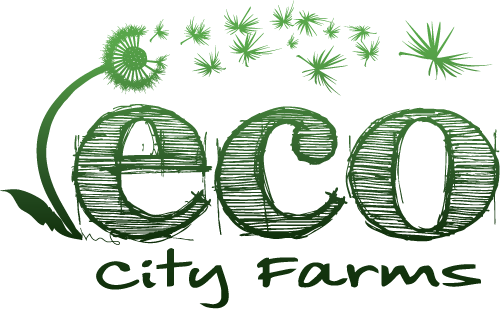Empowering Emerging Urban Farmers/Beginning farmer training program
ECO City Farm’s Beginning Farmer Training Program is designed to help beginning farmers learn the information and practice the skills they need to farm. Our free program includes comprehensive, practical, hands-on experiences; one-on-one mentoring; and a well-tested, graphics-rich, culturally-appropriate curriculum. Our curriculum covers all of the crop production, resource management, and administrative skills needed for graduates to roll up their sleeves and start farming.
In partnership with Prince George’s Community College (PGCC), the program entails 27 hours of classroom learning, and provides graduates with a Certificate of Urban Commercial Agriculture and continuing education credits upon completion of the program. The course, listed in PGCC’s catalog as AGR 322: Intensive Introduction to Urban Commercial Agriculture, is a key component of the Growing Urban Farms and Farmers program.

WHO IS ECO CITY FARMS?
ECO City Farms is a nonprofit urban teaching and learning farm in Prince George’s County that grows great food, farms and farmers in ways that protect, restore and sustain the natural environment and the health of local communities. We’ve been farming in PG County for over a decade.
SHOULD I APPLY TO THIS PROGRAM?
Consider applying if you:
- Have 0-3 years of growing experience – our program is aimed at beginners.
- Are interested in learning to grow primarily vegetables and culinary herbs in an urban or semi-urban environment, with additional learning opportunities focused on bees, composting, and perennial fruits.
- Are able to commute/carpool to PGCC’s Hyattsville Campus (located close to the PG Plaza/Hyattsville Crossing metro stop), our Edmonston and Bladensburg farm sites (4913 Crittenden St and 6100 Emerson St, respectively), and a variety of farm sites in/around PG county.
- Are excited to work closely and build relationships with members of your cohort, past cohorts, ECO incubator farmers, and ECO staff.
- Want the opportunity to collaborate with a small team of other trainees on growing food in a group plot in our beginning farmer high tunnel.
- Can make a 10 month commitment to attending 80% of program activities, including:
- From January through March: every Wednesday evening from 6-9 PM for class at PGCC, and every Saturday morning from 9 AM to 12 PM for hands-on workdays at one of ECO’s farms and/or a farm in/around PG county.
- From April through October (with the month of August off): 2 Wednesday evenings a month, and 2 Saturdays a month, for classes, farm tours, field days, and group workdays; additional time each month spent on group plot work.
WHAT TOPICS WILL THE PROGRAM COVER?
Our program covers the following topics in depth over the course of the season, via a combination of classes and hands-on workdays. Each of these lessons include acknowledgement and discussion of historical and contemporary social, economic and cultural circumstances that inform our practices, and the challenges that the intersecting realities of racism, capitalism, and gender inequities continue to present to beginning farmers.
- Nursery management: Managing potting mix composition, temperature, light, and water in a closed environment to propagate seedlings for transplant. This includes soil blocking and using trays to seed.
- Compost making: Compost pile creation and management in an urban environment, including bin systems, ASP systems, vermicomposting, and windrows.
- Farm systems management: Macro areas of systems design and implementation, including record-keeping, crop planning, irrigation system design, certification requirements, harvest and post-harvest procedures, crop rotation, and food safety.
- Marketing and finances: Farm business planning, marketing and communications, and financial recordkeeping.
- Infrastructure and tools: How to use and maintain hand and power tools, hoop houses, low-tunnels, farm machinery, irrigation equipment, cold storage, silage tarps, row covers, and insect netting.
- Soil health: Fostering resilient soils, including the use of cover crops, taking and interpreting soil tests, using organic amendments, implementing no-and minimal tillage practices, using crop rotation, using crop diversification, mulching, and more.
- Crop health and maintenance: Caring for plants from seeding to termination, including basic botany, pest and disease management, transplanting and direct seedling, weed management, and cultural practices (ex. trellising, season extension, harvest practices, and more).
WHEN DO I NEED TO APPLY BY?
The 2024 program application period has closed. We anticipate the 2025 application to open Fall 2024. If you’d like to get notice when the application is open, please complete the “Interest Form” below.
CONTACT
For more information, send an email with “BFTP 2025” in the subject line to program coordinator Tolu Igun at econewfarmer@gmail.com.



